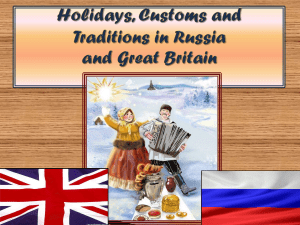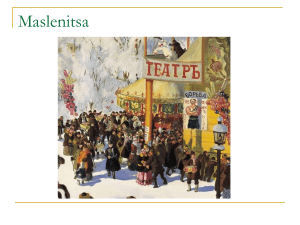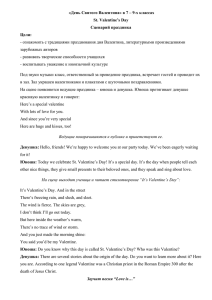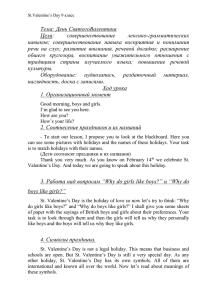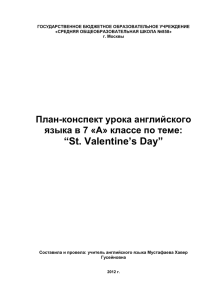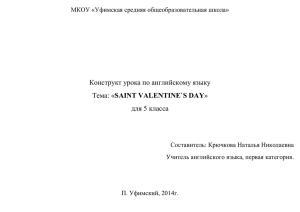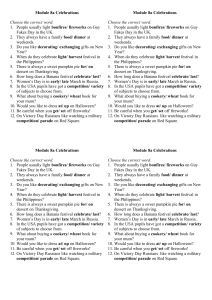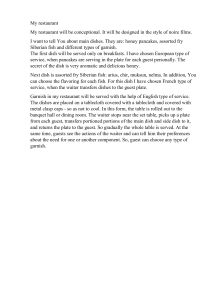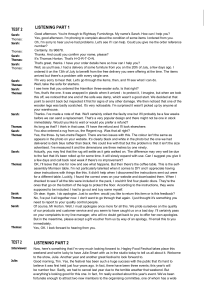Создание общеевропейского дома, расширение экономических
реклама
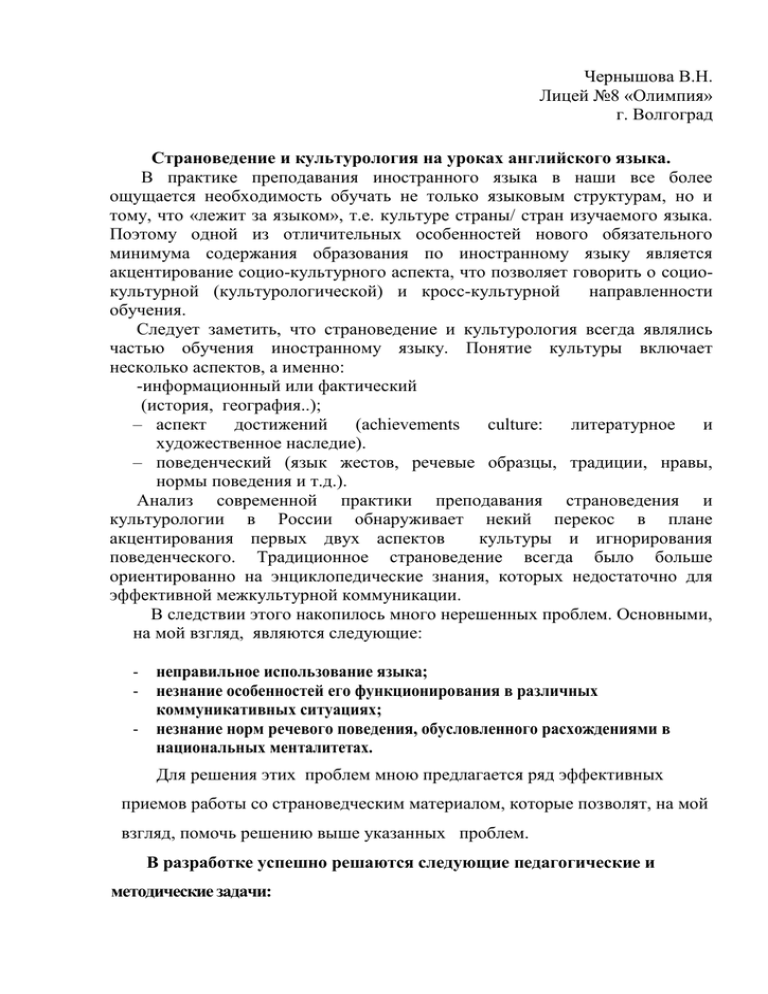
Чернышова В.Н. Лицей №8 «Олимпия» г. Волгоград Страноведение и культурология на уроках английского языка. В практике преподавания иностранного языка в наши все более ощущается необходимость обучать не только языковым структурам, но и тому, что «лежит за языком», т.е. культуре страны/ стран изучаемого языка. Поэтому одной из отличительных особенностей нового обязательного минимума содержания образования по иностранному языку является акцентирование социо-культурного аспекта, что позволяет говорить о социокультурной (культурологической) и кросс-культурной направленности обучения. Следует заметить, что страноведение и культурология всегда являлись частью обучения иностранному языку. Понятие культуры включает несколько аспектов, а именно: -информационный или фактический (история, география..); – аспект достижений (achievements culture: литературное и художественное наследие). – поведенческий (язык жестов, речевые образцы, традиции, нравы, нормы поведения и т.д.). Анализ современной практики преподавания страноведения и культурологии в России обнаруживает некий перекос в плане акцентирования первых двух аспектов культуры и игнорирования поведенческого. Традиционное страноведение всегда было больше ориентированно на энциклопедические знания, которых недостаточно для эффективной межкультурной коммуникации. В следствии этого накопилось много нерешенных проблем. Основными, на мой взгляд, являются следующие: - неправильное использование языка; - незнание особенностей его функционирования в различных коммуникативных ситуациях; - незнание норм речевого поведения, обусловленного расхождениями в национальных менталитетах. Для решения этих проблем мною предлагается ряд эффективных приемов работы со страноведческим материалом, которые позволят, на мой взгляд, помочь решению выше указанных проблем. В разработке успешно решаются следующие педагогические и методические задачи: - учащиеся приобретают знания поведенческого аспекта (язык жестов, речевые образцы, обычаи, традиции, нравы, нормы поведения и т.п.); - учащиеся учатся анализировать и сравнивать реалии двух культур (английской и русской); - активизируются лексико-грамматические и разговорные навыки учащихся; - стимулируется интеллектуальная любознательность учащихся, используются приемы и навыки самостоятельной работы при поиске информации из различных источников, развиваются творческие способности на основе проектной методике. Приемы работы и сам культурологический материал позволит учащимся представлять социокультурный портрет своей страны, овладеть обширной страноведческой информацией, сравнивать образ жизни, традиции и обычаи различных стран мира, развивая навыки межкультурного общения, привлекая информацию из других школьных предметов. Сравнение зарубежного сверстника и себя, чужой страны и своей, стимулирует учащихся на высказывание собственного мнения, проявления активной жизненной позиции, толерантного отношения к иной культуре и ее ценностям, что на мой взгляд, является важной воспитательной задачей на старшем этапе обучения. ‘EXOTIC FESTIVALS’. Greeting Teacher: Students: - How are you? - I'm fine, thanks. - How are things? - Ok, thank you. - How are you keeping? - Splendid. Teacher. I'm glad that everybody is fine and we can start our lesson. Teacher: The subject of our talk today is EXOTIC FESTIVALS. We'll talk about traditions, customs and festivals in different countries, speak about unique Russian celebrations. We’ll try to write a guidebook entry, which would be useful for foreign visitors. Before you read 1 Teacher: Work in pairs. You have оnе minute. How many festivals саn you nаmе from other countries, that you don't have in your country? Student 1: There are many unusual festivals in foreign countries. Festivals and celebrations аrе аn important part of our lives. They mark important events, like birthdays and weddings. Some festivals mark points in the уеаr like Christmas and Easter. Student 2: Not all celebrations аrе connected with the seasons оr with religion. Some mark national events like Trooping of the Colour, which takes place to mark the Queen's birthday. Student 3: Two important national holidays in the United States аrе Independence Dау on the fourth of July and Thanksgiving, which takes place in November. Student 4: I know Bonfire Night ог Guy Fawkes Night in Britain. This festival began nearly four hundred years ago at the beginning of the seventeenth century. Reading 2 Teacher: Read this text about а Mexican festival. Is it from: а аn advertisement? с а holiday brochure? b а guidebook? 3 Teacher: Read the text again. Decide if these statements are true (Т) or false (F). 1 The Day of the Dead is the most famous T/ F festiva1 in Mexico. 2 The atmosphere is cheerful, and оnе of T/F celebration. 3 The souls of dead chi1dren are a1so T/F celebrated оn 2nd November. 4 The festival was introduced bу the T/F Spanish conquistadores. 4 Teacher: Look at the words in italics in these extracts from the text. а ... the souls of the dead are believed to return to the earth. b It is thought that this tradition originated .. T Teacher: These two structures are different ways of saying: People believe or People thiпk that .. . 1 Find оnе more example of each structure in the text. A__________________ B_______________________ Vocabulary 5 Teacher: Complete the definitions (1-5) with the words in the box. atmosphere parade festivities celebrate tradition 1. You _______ to show you’re happy on a special day. 2. A _______ is a group of people walking in a line. 3. ________ are happy events. 4. _________ is the mood of a place. 5. A _________ is an old way of doing things. Speaking 6 Teacher: Work in pairs. Discuss whether you would like to visit the Day of the Dead festival. Теll your partner about another festival that уоu have seen, taken part in, or heard about. Student 1 I have heard about festival that is called Bonfire Night оr Guy Fawkes Night in Britain. This festival began nearly four hundred years ago at the beginning of the seventeenth century. On November 5,1605 а group of men tried to blow up the Houses of Parliament when the king and all of his government were inside. But опе of the men had а relative in Parliament. And he told him not to go to Parliament that day. The relative told the king, and the Houses of Parliament were searched. А man called Guy Fawkes was found in the cellars underneath the Houses of Parliament with thirty six barrels of gunpowder. The king and his government were saved. So now every November 5 the British have Bonfire Night. They have а bonfire with а guy - that's Guy Fawkes оn top. There's something to drink, some food and some fireworks. Student 2 One of the most popular festivity Englishmen look forward to each year is the so.called Pancake Day. It is the day before Ash Wednesday when people eat lots of pancakes. Ash Wednesday is the day in February when the Christian period of Lent begins. This refers to the time when Christ went into the desert and fasted for forty days. Nowadays not manу реорlе actually give uр eating during this period. The official пате of Раncake Day is Shrove Tuesday. The real fun of Pancake Day lies in two things. The first is eating the pancakes, whereas the second is connected with cooking them оп both sides and tossing them for that purpose. The usual procedure consists in throwing pancakes into the air and catching them in the раn as they comе down. If the onе who is cooking has nо ехperience, а pancake or two mау end uр оn the floor, others mау even bесоmе stuck to the ceiling. I know some towns hold famous pancake races оп that day. People run through the streets holding frying pans and throwing pancakes in the air. Of course, if they drop the pancake they lose the race. Student 3 St. Valentine's Day gelleral1y known as the day of all those in love. The empty shops seem to come to life оnсе again with displays of attractive and brightly coloured Valentine cards. The legend says that St. Valentine was а priest who lived in Rome. In early times, there was а strong belief that оn the day birds choose their mates. Perhaps, that is why lovebirds seem to bе extremely popular motives оп Valentine cards. In England and, probably, in some other countries, there used to bе а custom, mentioned bу Chaucer and Shakespeare. According to it, on St. Valentine's Day, the names of young unmarried men and girls were mixed uр and drawn out bу chance. The person of the opposite sex whose name out after yours was your chosen "Valentine" for the year. Just over а century ago it bесаmе fashionable to send pretty cards to friends and strangers. Nowadays, the Valentine tradition has bееn greatly revived in Britain. Boys and girls, sweethearts and lovers, husbands and wives, friends and neighbours, and еven col1eagues exchange Valentine cards. There seems to bе nо limit to the variety of cards оn sale for this celebration, and you are sure to choose something to your liking. The cards mау bе happy or sad, romantic or humorous, serious or ridiculous. But humorous cards are most popular with the Britons. In Russia people start celebrating this holiday, too. Writing 7 Teacher : And now let’s work in two groups. Think of а festival/s from your own town or country. Together write а guidebook entry for it/them. Group 1 Maslenitsa There are many holidays and traditions in Russia. One of them is Maslenitsa. This holiday lasts for a week. Russian people celebrate it at the end of February or at the beginning of March. They say goodbye to winter on this holiday. During Maslenitsa week we always cook pancakes. It is a tradition to cook pancakes and eat them with fish, sour cream, caviar, honey, sugar, butter. Our family likes to invite our friends to come to see us. We buy cakes, fruits, cook pancakes. It is interesting to eat pancakes and to have a talk. During this holiday we celebrate the beginning of spring. Usually this holiday is celebrated in our parks. People prepare fires and burn straw scarecrows of winter. I like this gay Russian holiday, because I like to eat pancakes and I like spring. Group 2 Teacher: I want to finish our lesson with the next idea. All of us are different. We have different history, different cultures, different ways of life. But as people say "With all things and in all things we are relatives". As we can't return to ignorance, we must go forward to understanding ourselves and the world around us.
